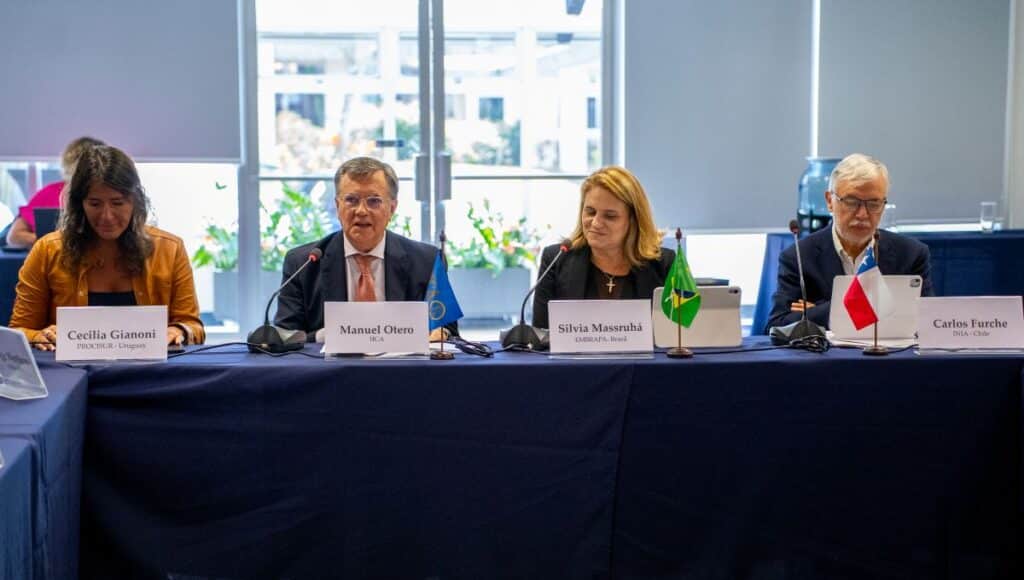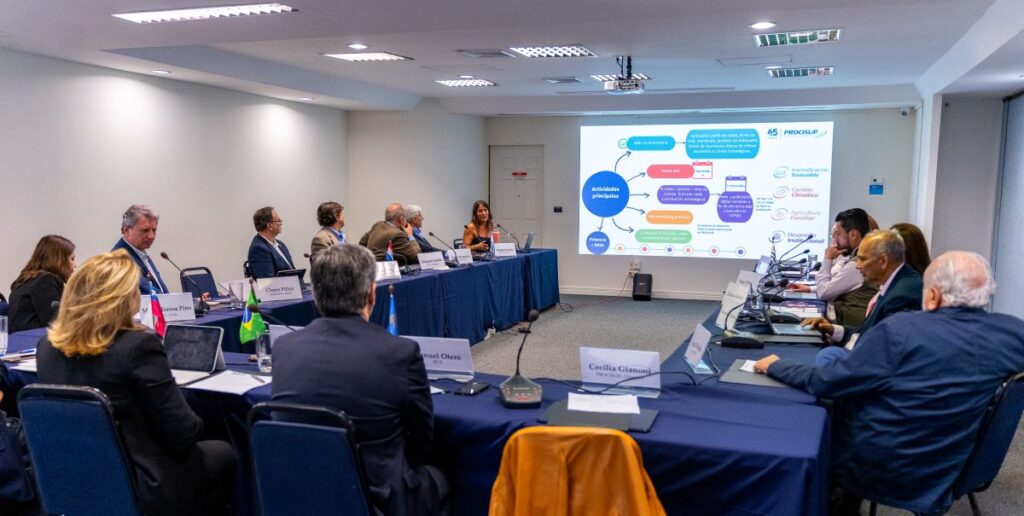
San Jose, 27 March 2025 (IICA) – The formulation of an animal health project on genetics-based tools and actions for tick control and resistance improvement; the use of emerging technologies to foster the market access and competitiveness of small farmers; and the creation of a regional bioprospecting platform are three new proposals that have been prioritized in the annual work plan of the Cooperative Program for the Development of Agrifood and Agricultural Technology in the Southern Cone (PROCISUR).
This was determined in a meeting of the PROCISUR Board of Directors at the Headquarters of the Inter-American Institute for Cooperation on Agriculture (IICA), in San Jose, Costa Rica.
PROCISUR was established in 1980 as a mechanism to integrate and facilitate coordination among the national agricultural research institutes of Argentina, Bolivia, Brazil, Chile, Paraguay and Uruguay, with IICA overseeing the Executive Secretariat. It seeks to strengthen cooperation and coordination in sustainable agri-biofood and agri-bioindustrial research, development and innovation, to tackle strategic challenges facing the region.
“We have worked to identify joint projects and to foster cooperation on sustainable production, climate change and family farming, which could be shared and replicated from country to country. We also discussed institutional and organizational challenges that research and innovation institutions around the world are facing”, explained the President of the Brazilian Agricultural Research Corporation (EMBRAPA) and Chair of the PROCISUR Board of Directors, Silvia Massruhá.
The meeting stressed the fact that tick control is a strategic priority for ministers in the Southern Region, who would therefore aim to escalate work that is being conducted in that area in Argentina, Uruguay and Brazil.
On the matter of emerging technologies, the countries intend to capitalize on experience gained in EMBRAPA’s Semear Digital project, which has sought to harness information and communication technologies to drive agricultural digitalization, with a view to enabling small and medium-scale famers, including youth and women, to access digital innovations, while improving productivity and sustainability in rural areas.
“As we begin to create a regional bioprospecting platform, we must identify all the samples of microorganisms found in the region’s soils, to generate a shared databank. We can then determine their possible uses in production, for example as bioinputs or for genetic improvement, as a means of ensuring production efficiency in more restrictive conditions”, said the Executive Secretary of PROCISUR, Cecilia Gianoni.
In this way, the initiatives will build on actions that the program is undertaking within its four strategic areas of focus: sustainable intensification, family farming, climate change and institutional development.
Nicolás Bronzovich, from the National Agricultural Technology Institute (INTA) of Argentina, noted that, “Our countries are facing similar challenges. It is critical that we devise a common agenda, strengthen ourselves and develop new ideas. Technology and science are increasing at an exponential rate and are accelerating. We must be dynamic and adapt to this scientific and technological context. I consider it extremely valuable that we come together to find systemic solutions”.
The participants also agreed to strengthen PROCISUR’s communication strategy as it marks its 45th anniversary—demonstrating the regional mechanism’s results and contributions over the years, primarily in science, technology and innovation, as drivers of production transformation; inclusive innovation and competitiveness; and resilience and sustainability in tackling global challenges.
Activities will include the launch of a new website, a commemorative book highlighting its major milestones, production of audiovisual materials on technologies and high-impact initiatives that it has spearheaded and social media campaigns, among others.
Carlos Furche, Director of Chile’s Agricultural Research Institute, reflected that, “PROCISUR demonstrates the type of effort and performance that we need in this era. Research institutes have a tremendous influence on agricultural transformation. We must seek concrete results; contribute to resolving challenges facing agriculture, such as climate change adaptation; find ways to drive innovation and technology adoption; produce more with less; improve the standard of living of our people; and create conditions that enable us to access international markets, using fewer natural and financial resources and ensuring efficiency in everything that we do”.

Looking ahead to COP30: Science, technology and innovation, driving transformation
Another of the key issues addressed in the meeting was the need to devise a clear strategy to guide PROCISUR’s participation in the United Nations Climate Change Conference (COP30), to be held in Belém, Brazil from 10-21 November.
For the fourth consecutive year, IICA will install the Home of Sustainable Agriculture of the Americas pavilion at COP, where PROCISUR will host an event as part of its 45th anniversary, highlighting its contributions in addressing the challenges and capitalizing on the opportunities inherent in climate change adaptation and mitigation. EMBRAPA will have a similar pavilion, where PROCISUR will host a technology showcase featuring innovative technologies.
IICA Director General, Manuel Otero, remarked that, “PROCISUR is a fundamental and essential platform to drive new transformations in agriculture, particularly under the current circumstances. After forty-five years, it has proven itself to be a resilient program that must assume a leadership role in our region and the world. IICA believes that COP30 will provide us with an immense opportunity to justify the need for sustainable agriculture, as well as the importance of public and private collaboration and science and innovation”.
Moreover, the President of the Agricultural Technology Institute of Paraguay, Edgar Esteche, noted that, “It is vital that we convey the immense challenge that research institutes face in a world that is changing and at a critical time. All eyes are on the region, given its role in food security. So, we cannot let these opportunities to strengthen our countries pass. Thus, COP30 will be extremely important in demonstrating the potential, stability and work approach of the region and PROCISUR”.











